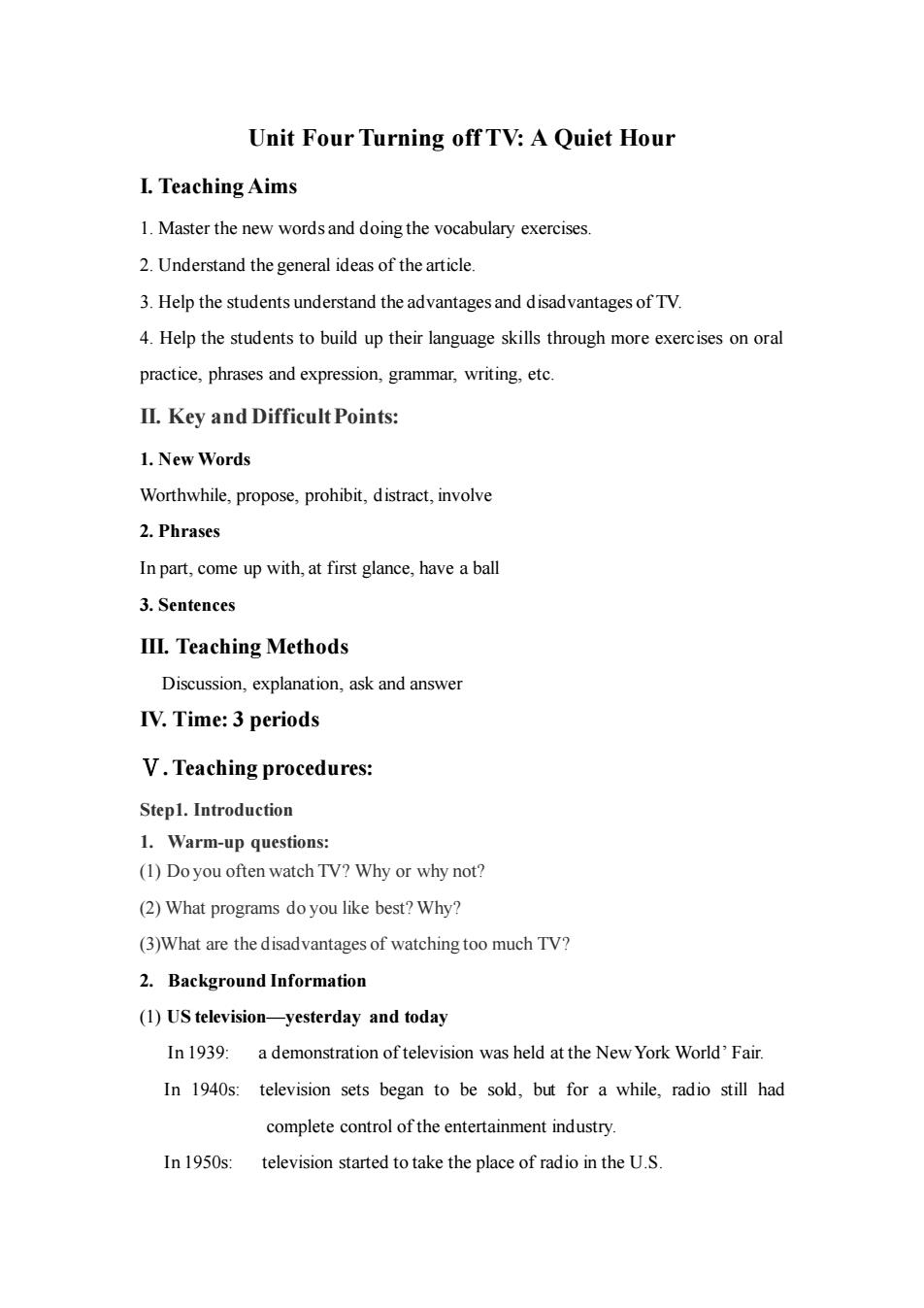
Unit Four Turning off TV:A Quiet Hour I.Teaching Aims 1.Master the new words and doing the vocabulary exercises 2.Understand the general ideas of the article. 3.Help the students understand the advantages and disadvantages of TV. 4.Help the students to build up their language skills through more exercises on oral practice,phrases and expression,grammar,writing,etc II.Key and Difficult Points 1.New Words Worthwhile,propose.prohibit,distract,involve 2.Phrases In part,come up with,at first glance,have a ball 3.Sentences III.Teaching Methods Discussion,explanation,ask and answer IV.Time:3 periods V.Teaching procedures: Stepl.Introduction 1.Warm-up questions: (1)Doyou often watch TV?Why or why not? (2)What programs do you like best?Why? (3)What are the disadvantages of watching too much TV? 2.Background Information (1)US television-yesterday and today In 1939:a demonstration oftelevision was held at the New York World'Fair. In 1940s:television sets began to be sol,but for a while,radio still had completecontrol of the entertainment industry. In1950s: television started to take the place of radio in the U.S
Unit Four Turning off TV: A Quiet Hour I. Teaching Aims 1. Master the new words and doing the vocabulary exercises. 2. Understand the general ideas of the article. 3. Help the students understand the advantages and disadvantages of TV. 4. Help the students to build up their language skills through more exercises on oral practice, phrases and expression, grammar, writing, etc. II. Key and Difficult Points: 1. New Words Worthwhile, propose, prohibit, distract, involve 2. Phrases In part, come up with, at first glance, have a ball 3. Sentences III. Teaching Methods Discussion, explanation, ask and answer IV. Time: 3 periods Ⅴ. Teaching procedures: Step1. Introduction 1. Warm-up questions: (1) Do you often watch TV? Why or why not? (2) What programs do you like best? Why? (3)What are the disadvantages of watching too much TV? 2. Background Information (1) US television—yesterday and today In 1939: a demonstration of television was held at the New York World’ Fair. In 1940s: television sets began to be sold, but for a while, radio still had complete control of the entertainment industry. In 1950s: television started to take the place of radio in the U.S

In 1960s:American TV audience included almost every family Today: there are a thousand stations all over the country. (2)Generation Gap The term is used to mean differences in ideas,life styles and attitudes between older and younger people,differences which will be result in a lack of understanding between them and frequently lead to confrontations. (3)Divorce Rate High divorce rate is a major social problem in the US.At present,it is estimated, about one quarter to one third of all American marriages end in divorce.Although different in opinions,some studies indicate that there are more cases with the following reasons A)low incomes B)inadequate education C)marriage at a very young age The immediate result that arises from the high divorce rate is an increasing number of single parent homes. 3.Introductory Remarks Television,since its first prevalence over radio in the 1950s,has played a more and more important role in people's lives.As a matter of fact,it has become so much a part of human life that a modern world without television is not worth living.But some,on the other hand,argue against TV.They think TV is taking up too much of a person's time and making him lazy,not to mention its harmful influence upon him, The author of this article,for example,is raising his voice against TV,urging viewers totu off their sets and enjoy a precious quiet hour,an hour without the distraction ofTV. Step2.Global Reading 1.Questions about the text (1)Some worthwhile programs are mentioned in the Editor's Note.What are they? Can you cite some of them? (2)What does Mayer suggest in his article?
In 1960s: American TV audience included almost every family. Today: there are a thousand stations all over the country. (2) Generation Gap The term is used to mean differences in ideas, life styles and attitudes between older and younger people, differences which will be result in a lack of understanding between them and frequently lead to confrontations. (3) Divorce Rate High divorce rate is a major social problem in the US. At present, it is estimated, about one quarter to one third of all American marriages end in divorce. Although different in opinions, some studies indicate that there are more cases with the following reasons: A) low incomes B) inadequate education C) marriage at a very young age The immediate result that arises from the high divorce rate is an increasing number of single parent homes. 3. Introductory Remarks Television, since its first prevalence over radio in the 1950s, has played a more and more important role in people’s lives. As a matter of fact, it has become so much a part of human life that a modern world without television is not worth living. But some, on the other hand, argue against TV. They think TV is taking up too much of a person’s time and making him lazy, not to mention its harmful influence upon him, The author of this article, for example, is raising his voice against TV, urging viewers to turn off their sets and enjoy a precious quiet hour, an hour without the distraction of TV. Step2. Global Reading 1. Questions about the text (1) Some worthwhile programs are mentioned in the Editor’s Note. What are they? Can you cite some of them? (2)What does Mayer suggest in his article?
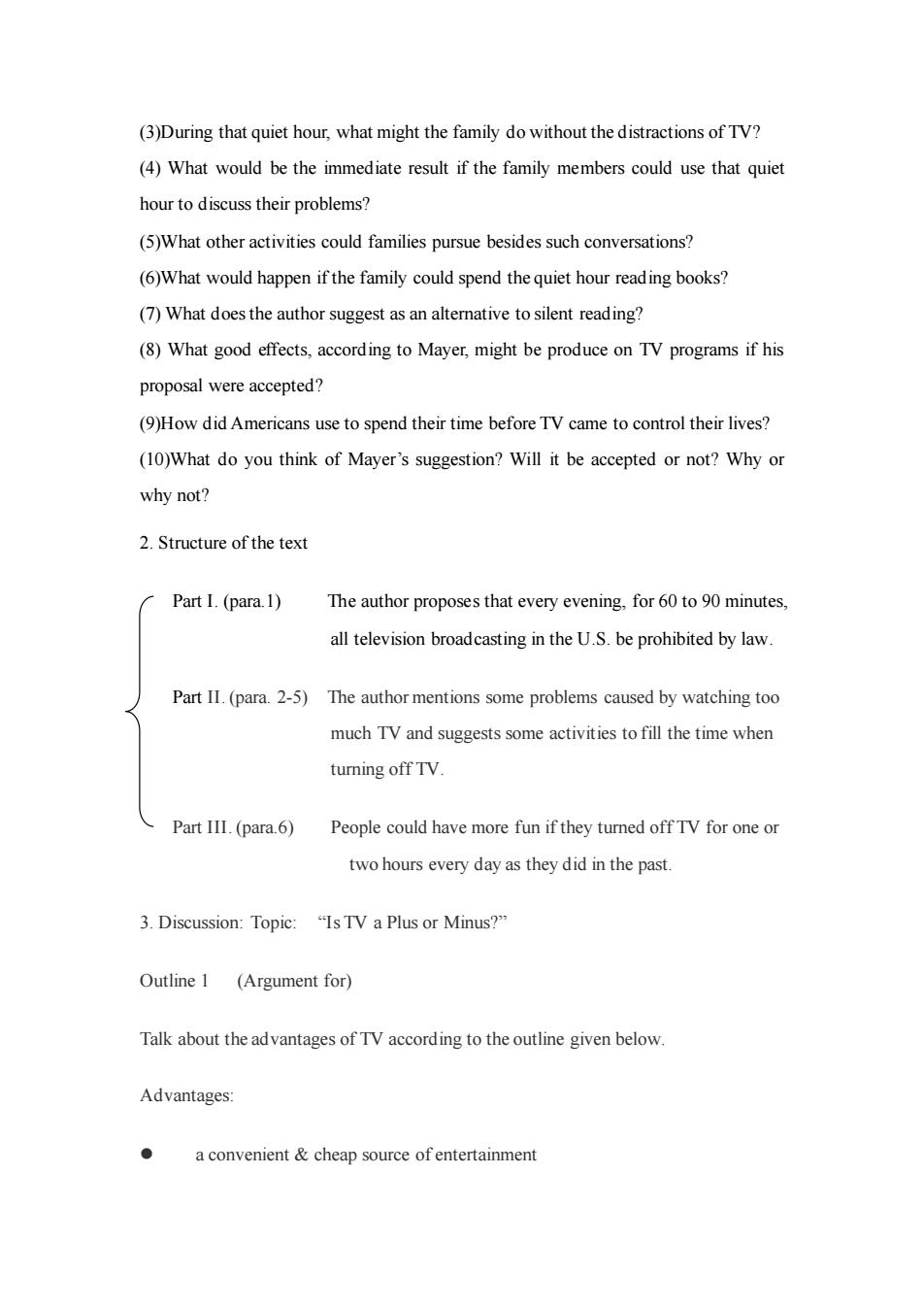
(3)During that quiet hour,what might the family do without the distractions of TV? (4)What would be the immediate result if the family members could use that quiet hour to discuss their problems? (5)What other activities could families pursue besides such conversations? (6)What would happen if the family could spend the quiet hour reading books? (7)What does the author suggest as an altemative to silent reading? (8)What good effects,according to Mayer,might be produce on TV programs if his proposal were accepted? (9)How did Americans use to spend their time before TV came to control their lives? (10)What do you think of Mayer's suggestion?Will it be accepted or not?Why or why not? 2.Structure of the text Part I.(para.1) The author proposes that every evening.for 60 to90 minutes, all television broadcasting in the U.S.be prohibited by law Part II.(para.2-5)The author mentions some problems caused by watching too much TV and suggests some activities to fill the time when turning off TV. Part III.(para6) People could have more fun if they turned off TV for one or two hours every day as they did in the past. 3.Discussion:Topic:"Is TV a Plus or Minus?" Outline 1 (Argument for) Talk about the advantages of TV according to the outline given below Advantages: ● a convenient cheap source of entertainment
(3)During that quiet hour, what might the family do without the distractions of TV? (4) What would be the immediate result if the family members could use that quiet hour to discuss their problems? (5)What other activities could families pursue besides such conversations? (6)What would happen if the family could spend the quiet hour reading books? (7) What does the author suggest as an alternative to silent reading? (8) What good effects, according to Mayer, might be produce on TV programs if his proposal were accepted? (9)How did Americans use to spend their time before TV came to control their lives? (10)What do you think of Mayer’s suggestion? Will it be accepted or not? Why or why not? 2. Structure of the text Part I. (para.1) The author proposes that every evening, for 60 to 90 minutes, all television broadcasting in the U.S. be prohibited by law. Part II. (para. 2-5) The author mentions some problems caused by watching too much TV and suggests some activities to fill the time when turning off TV. Part III. (para.6) People could have more fun if they turned off TV for one or two hours every day as they did in the past. 3. Discussion: Topic: “Is TV a Plus or Minus?” Outline 1 (Argument for) Talk about the advantages of TV according to the outline given below. Advantages: ⚫ a convenient & cheap source of entertainment
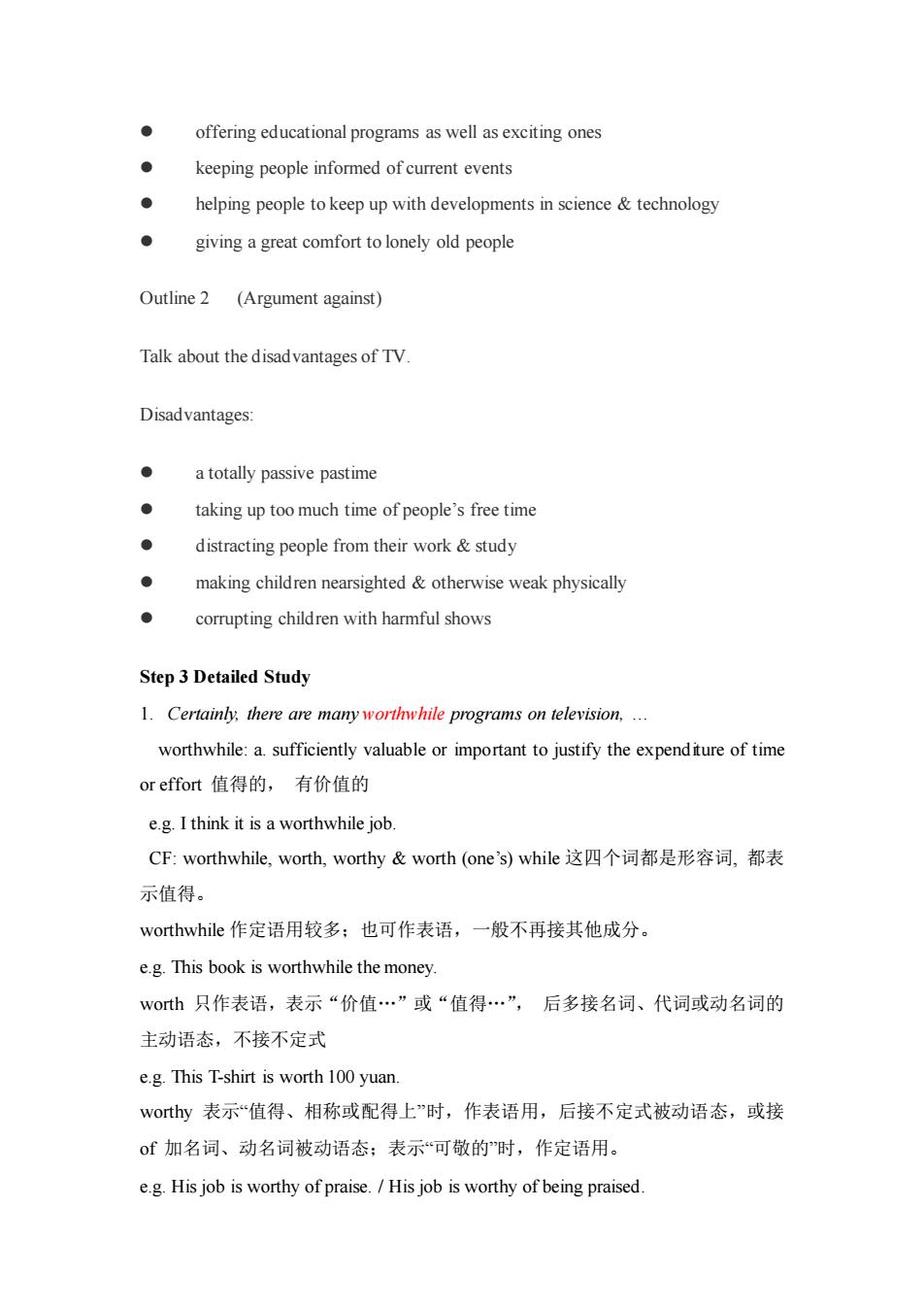
offering educational programs as well as exciting ones keeping people informed of current events helping people to keep up with developments in science&technology ● giving a great comfort to lonely old people Outline 2 (Argument against) Talk about the disadvantages of TV. Disadvantages ● a totally passive pastime taking up too much time of people's free time ● distracting people from their work&study ● making children nearsighted&otherwise weak physically ● corrupting children with harmful shows Step 3 Detailed Study 1.Certainly.there are many worthwhile programs on television. worthwhile:a.sufficiently valuable or important to justify the expenditure of time or effort值得的,有价值的 e.g.I think it is a worthwhile job CF:worthwhile,.worth,worthy&worth(one's)while这四个词都是形容词,都表 示值得。 worthwhile作定语用较多:也可作表语,一般不再接其他成分。 e.g.This book is worthwhile the money woth只作表语,表示“价值…”或“值得…”,后多接名词、代词或动名词的 主动语态,不接不定式 e.g.This T-shirt is worth 100 yuan. worthy表示“值得、相称或配得上”时,作表语用,后接不定式被动语态,或接 0f加名词、动名词被动语态:表示“可敏的时,作定语用。 e.g.His job is worthy of praise./His job is worthy of being praised
⚫ offering educational programs as well as exciting ones ⚫ keeping people informed of current events ⚫ helping people to keep up with developments in science & technology ⚫ giving a great comfort to lonely old people Outline 2 (Argument against) Talk about the disadvantages of TV. Disadvantages: ⚫ a totally passive pastime ⚫ taking up too much time of people’s free time ⚫ distracting people from their work & study ⚫ making children nearsighted & otherwise weak physically ⚫ corrupting children with harmful shows Step 3 Detailed Study 1. Certainly, there are many worthwhile programs on television, … worthwhile: a. sufficiently valuable or important to justify the expenditure of time or effort 值得的, 有价值的 e.g. I think it is a worthwhile job. CF: worthwhile, worth, worthy & worth (one’s) while 这四个词都是形容词, 都表 示值得。 worthwhile 作定语用较多;也可作表语,一般不再接其他成分。 e.g. This book is worthwhile the money. worth 只作表语,表示“价值…”或“值得…”, 后多接名词、代词或动名词的 主动语态,不接不定式 e.g. This T-shirt is worth 100 yuan. worthy 表示“值得、相称或配得上”时,作表语用,后接不定式被动语态,或接 of 加名词、动名词被动语态;表示“可敬的”时,作定语用。 e.g. His job is worthy of praise. / His job is worthy of being praised
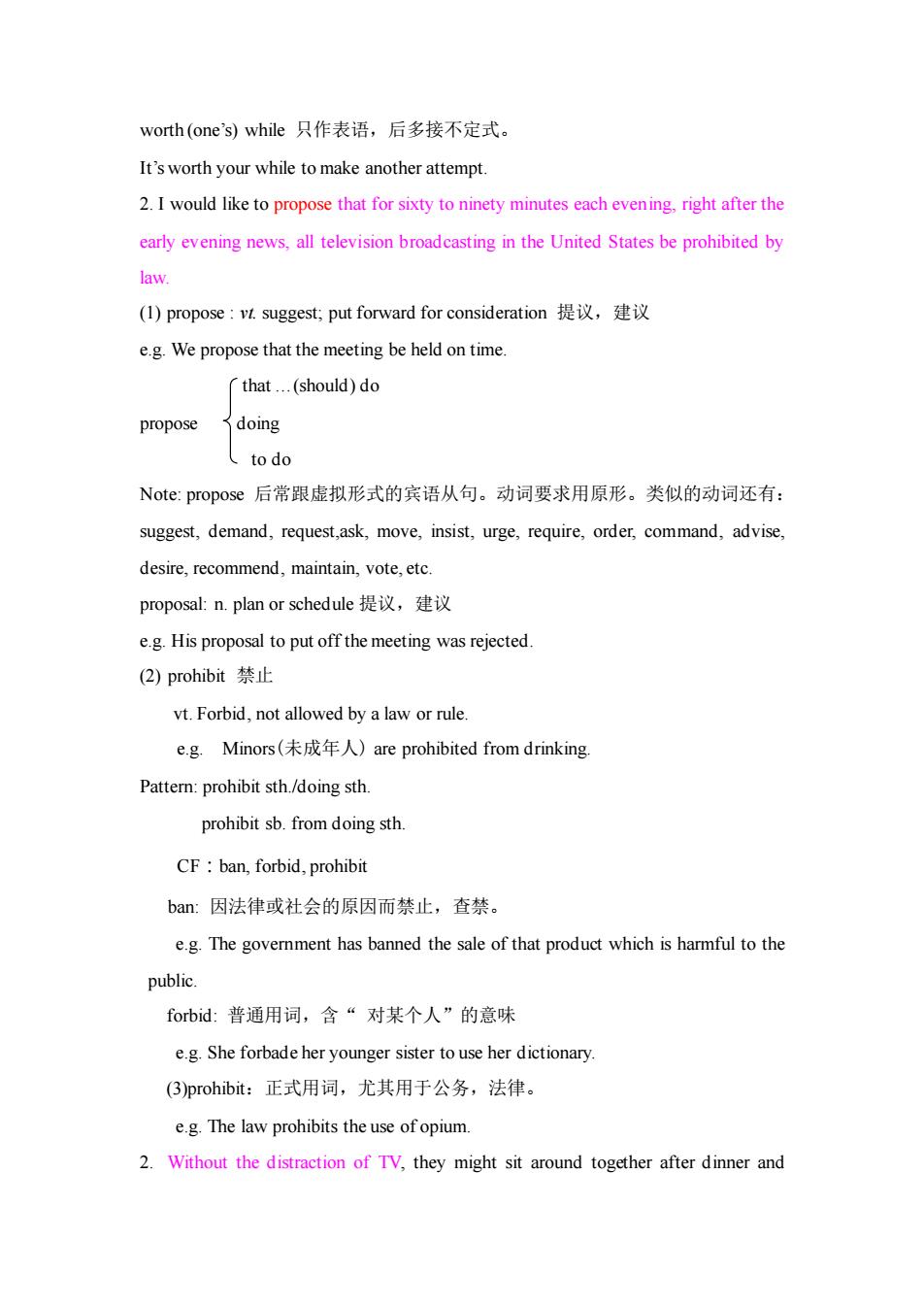
worth(ones)while只作表语,后多接不定式 It's worth your while to make another attempt. 2.I would like to propose that for sixty to ninety minutes each evening,right after the early evening news,all television broadcasting in the United States be prohibited by law. (I)propose:v1.suggest;,put forward for consideration提议,建议 e.g.We propose that the meeting be held on time (that.(should)do propose doing to do Note:propose后常跟虚拟形式的宾语从句。动词要求用原形。类似的动词还有: suggest,demand,request,ask,move,insist,urge,require,order,command,advise, desire,recommend,maintain,vote,etc. proposal:n.plan or schedule提议,建议 e.g.His proposal to put off the meeting was rejected (2)prohibit禁止 vt.Forbid,not allowed by a law or rule. e,Minors(未成年人)are prohibited from drinking Pattern:prohibit sth./doing sth. prohibit sb.from doing sth. CF:ban,forbid,prohibit ban:因法律或社会的原因而禁止,查禁 e.g.The govemnment has banned the sale of that product which is harmful to the public. forbid:普通用词,含“对某个人”的意味 e.g.She forbade her younger sister to use her dictionary. (3)prohibit:正式用词,尤其用于公务,法律。 e.g.The law prohibits the use of opium 2.Without the distraction of TV,they might sit around together after dinner and
worth (one’s) while 只作表语,后多接不定式。 It’s worth your while to make another attempt. 2. I would like to propose that for sixty to ninety minutes each evening, right after the early evening news, all television broadcasting in the United States be prohibited by law. (1) propose : vt. suggest; put forward for consideration 提议,建议 e.g. We propose that the meeting be held on time. that …(should) do propose doing to do Note: propose 后常跟虚拟形式的宾语从句。动词要求用原形。类似的动词还有: suggest, demand, request,ask, move, insist, urge, require, order, command, advise, desire, recommend, maintain, vote, etc. proposal: n. plan or schedule 提议,建议 e.g. His proposal to put off the meeting was rejected. (2) prohibit 禁止 vt. Forbid, not allowed by a law or rule. e.g. Minors(未成年人) are prohibited from drinking. Pattern: prohibit sth./doing sth. prohibit sb. from doing sth. CF:ban, forbid, prohibit ban: 因法律或社会的原因而禁止,查禁。 e.g. The government has banned the sale of that product which is harmful to the public. forbid: 普通用词,含“ 对某个人”的意味 e.g. She forbade her younger sister to use her dictionary. (3)prohibit:正式用词,尤其用于公务,法律。 e.g. The law prohibits the use of opium. 2. Without the distraction of TV, they might sit around together after dinner and
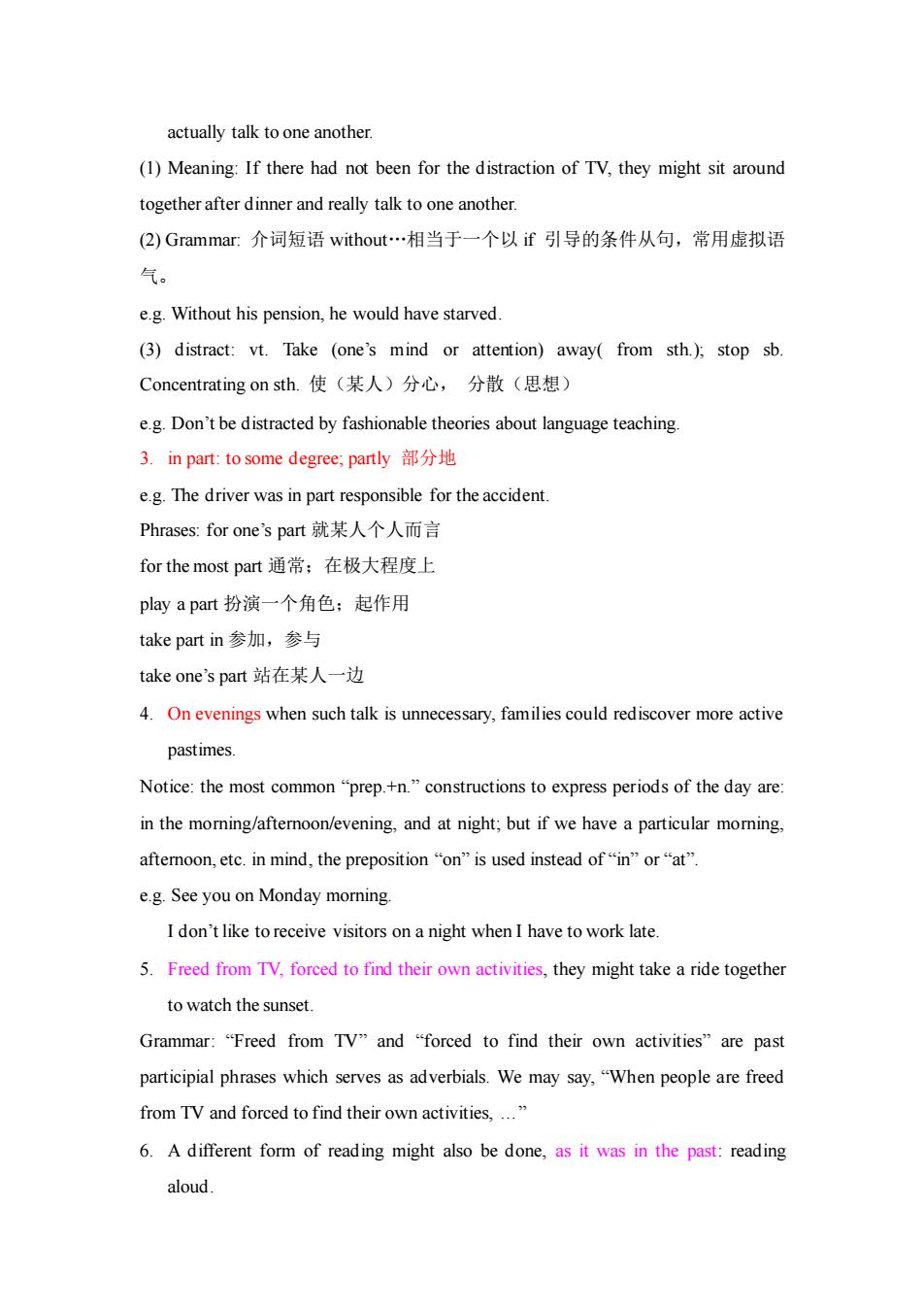
actually talk to one another. (1)Meaning:If there had not been for the distraction of TV,they might sit around together after dinner and really talk to one another (2)Grammar:.介词短语without.…相当于一个以f引导的条件从句,常用虚拟语 气。 e.g.Without his pension,he would have starved. (3)distract:vt.Take (one's mind or attention)away(from sth.),stop sb. Concentrating on sth..使(某人)分心,分散(思想) e.g.Don't be distracted by fashionable theories about language teaching 3.in part:to some degree;partly部分地 e.g.The driver was in part responsible for the accident Phrases::for one's part就某人个人而言 for the most part通常:在极大程度上 play a part扮演一个角色:起作用 take part in参加,参与 take one's part站在某人一边 4.On evenings when such talk is unnecessary,families could rediscover more active pastimes. Notice:the most common"prep.+n."constructions to express periods of the day are: in the moming/afteroon/evening,and at night;but if we have a particular moming. aftemoon,etc.in mind,the preposition“on”is used instead of“in”or“at' e.g.See you on Monday morning. I don't like to receive visitors on a night when I have to work late. 5.Freed from TV,forced to find their own activities,they might take a ride together to watch the sunset. Grammar:"Freed from TV"and "forced to find their own activities"are past participial phrases which serves as adverbials.We may say,"When people are freed from TV and forced to find their own activities,..." 6.A different form of reading might also be done,as it was in the past:reading aloud
actually talk to one another. (1) Meaning: If there had not been for the distraction of TV, they might sit around together after dinner and really talk to one another. (2) Grammar: 介词短语 without…相当于一个以 if 引导的条件从句,常用虚拟语 气。 e.g. Without his pension, he would have starved. (3) distract: vt. Take (one’s mind or attention) away( from sth.); stop sb. Concentrating on sth. 使(某人)分心, 分散(思想) e.g. Don’t be distracted by fashionable theories about language teaching. 3. in part: to some degree; partly 部分地 e.g. The driver was in part responsible for the accident. Phrases: for one’s part 就某人个人而言 for the most part 通常;在极大程度上 play a part 扮演一个角色;起作用 take part in 参加,参与 take one’s part 站在某人一边 4. On evenings when such talk is unnecessary, families could rediscover more active pastimes. Notice: the most common “prep.+n.” constructions to express periods of the day are: in the morning/afternoon/evening, and at night; but if we have a particular morning, afternoon, etc. in mind, the preposition “on” is used instead of “in” or “at”. e.g. See you on Monday morning. I don’t like to receive visitors on a night when I have to work late. 5. Freed from TV, forced to find their own activities, they might take a ride together to watch the sunset. Grammar: “Freed from TV” and “forced to find their own activities” are past participial phrases which serves as adverbials. We may say, “When people are freed from TV and forced to find their own activities, …” 6. A different form of reading might also be done, as it was in the past: reading aloud
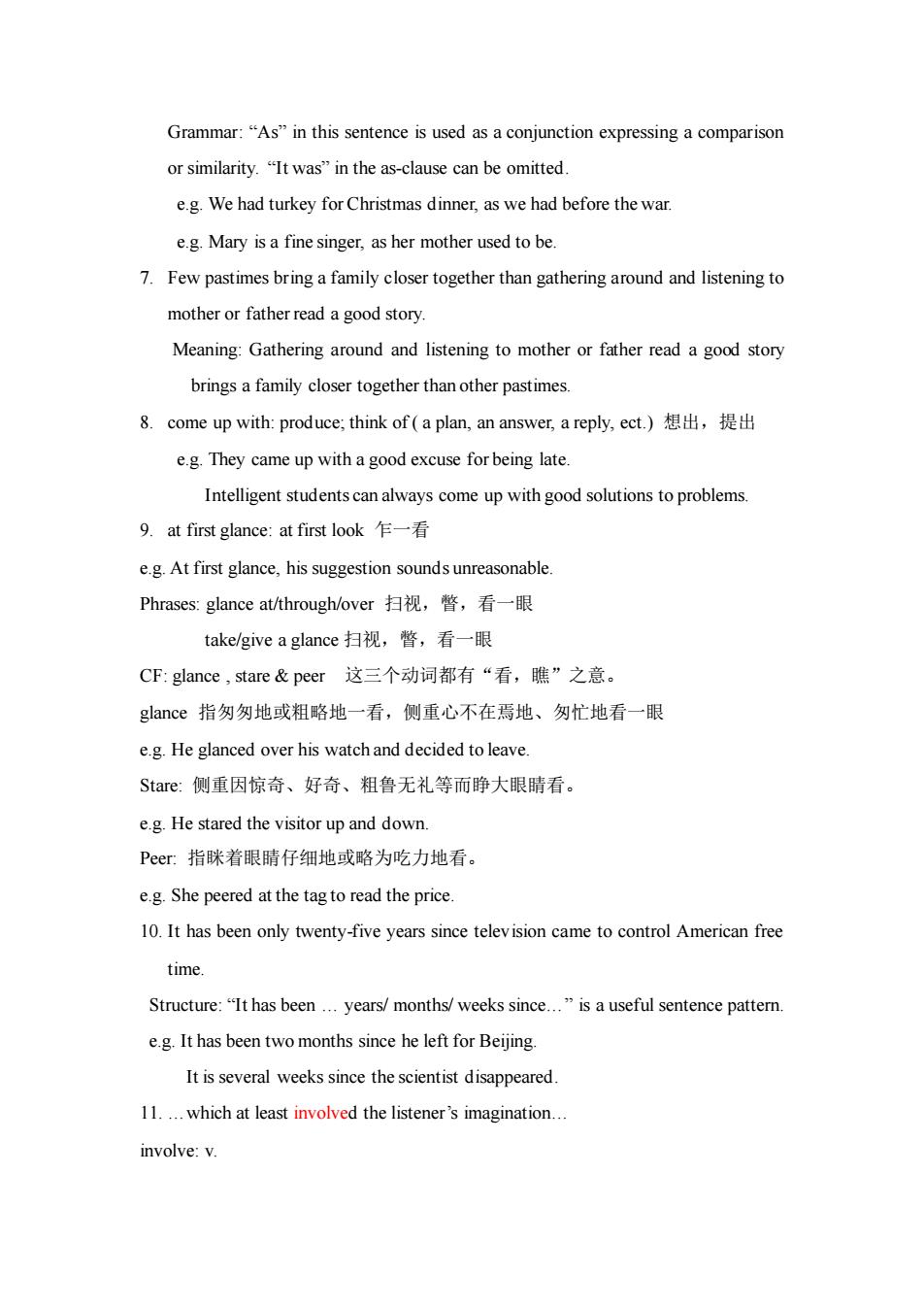
Grammar:"As"in this sentence is used as a conjunction expressing a comparison or similarity."It was"in the as-clause can be omitted. e.g.We had turkey for Christmas dinner,as we had before the war e.g.Mary is a fine singer,as her mother used to be. 7.Few pastimes bring a family closer together than gathering around and listening to mother or father read a good story Meaning:Gathering around and listening to mother or father read a good story brings a family closer together than other pastimes. 8.come up with:produce,think of(a plan,,an answer,.a reply,ect)想出,提出 e.g.They came up with a good excuse for being late Intelligent students can always come up with good solutions to problems. 9.at first glance:at first look乍一看 e.g.At first glance,his suggestion sounds unreasonable. Phrases:glance at/through/.over扫视,瞥,看-眼 take/give a glance扫视,瞥,看一眼 CF:glance,stare&peer这三个动词都有“看,瞧”之意。 glance指匆匆地或粗略地一看,侧重心不在焉地、匆忙地看一眼 e.g.He glanced over his watch and decided to leave Stare:侧重因惊奇、好奇、粗鲁无礼等而睁大眼睛看。 e.g.He stared the visitor up and down. Peer:指眯着眼睛仔细地或略为吃力地看。 e.g.She peered at the tagto read the price. 10.It has been only twenty-five years since television came to control American free time. Structure:"It has been...years/months/weeks since.."is a useful sentence patter. e.g.It has been two months since he left for Beijing. It is several weeks since the scientist disappeared. 11....which at least involved the listener's imagination. involve:v
Grammar: “As” in this sentence is used as a conjunction expressing a comparison or similarity. “It was” in the as-clause can be omitted. e.g. We had turkey for Christmas dinner, as we had before the war. e.g. Mary is a fine singer, as her mother used to be. 7. Few pastimes bring a family closer together than gathering around and listening to mother or father read a good story. Meaning: Gathering around and listening to mother or father read a good story brings a family closer together than other pastimes. 8. come up with: produce; think of ( a plan, an answer, a reply, ect.) 想出,提出 e.g. They came up with a good excuse for being late. Intelligent students can always come up with good solutions to problems. 9. at first glance: at first look 乍一看 e.g. At first glance, his suggestion sounds unreasonable. Phrases: glance at/through/over 扫视,瞥,看一眼 take/give a glance 扫视,瞥,看一眼 CF: glance , stare & peer 这三个动词都有“看,瞧”之意。 glance 指匆匆地或粗略地一看,侧重心不在焉地、匆忙地看一眼 e.g. He glanced over his watch and decided to leave. Stare: 侧重因惊奇、好奇、粗鲁无礼等而睁大眼睛看。 e.g. He stared the visitor up and down. Peer: 指眯着眼睛仔细地或略为吃力地看。 e.g. She peered at the tag to read the price. 10. It has been only twenty-five years since television came to control American free time. Structure: “It has been … years/ months/ weeks since…” is a useful sentence pattern. e.g. It has been two months since he left for Beijing. It is several weeks since the scientist disappeared. 11. …which at least involved the listener’s imagination… involve: v

a.have a part or result包括 e.g.To apply for university study involves taking the College Entrance Examination b.cause tobe mixed up(in sth.)卷入,牵涉 e.g.It is said that many politicians were involved in the drug traffic. 12.It wasn't that difficult.Honest.The truth is we had a ball. (1)Meaning:It wasn't so difficult for people to occupy their spare time without the help of TV.I'm telling you the truth:we Americans used to have a very good time before TV came into our life. (2)Notice:The word"honest"is used colloquially,meaning"honestly"or"truly" e.g.I saw a UFO last nigh Honest. (3)"Have a ball"is an American slang expression,which means"have a lot of fun”or“have a good time. Step 4 Summary 1.Important words and phrases 2.Main idea of the text Mr.Mayer,the author of this article is raising his voice against watching TV all the time in spite of the fact that there are many worthwhile programs:news,plays,movies,concerts,and educational programs for children, programs on current social problems,and so on. In his opinion,many problems from the generation gap to the high divorce rate to forms of mental illness are caused at least in part by failure to communicate. He suggests that people turn off their TV sets for one hour each evening.which will make people understand each other better,and help families rediscover more active pastime.Without the distraction of TV,a more literate new generation could be produced,and people could also have a wonderful time.Of course,the author's suggestion sounds reasonable but hard to be put into practice. Step5 Homework 1.Master the expressions and important sentences in the text 2.Review the text and finish the exercises on P76-85
a. have a part or result 包括 e.g. To apply for university study involves taking the College Entrance Examination. b. cause to be mixed up ( in sth.) 卷入,牵涉 e.g. It is said that many politicians were involved in the drug traffic. 12. It wasn’t that difficult. Honest. The truth is we had a ball. (1)Meaning: It wasn’t so difficult for people to occupy their spare time without the help of TV. I’m telling you the truth: we Americans used to have a very good time before TV came into our life. (2) Notice: The word “honest” is used colloquially, meaning “honestly” or “truly”, e.g. I saw a UFO last nigh .Honest. (3) “Have a ball” is an American slang expression, which means “have a lot of fun” or “have a good time.” Step 4 Summary 1. Important words and phrases 2. Main idea of the text Mr. Mayer, the author of this article is raising his voice against watching TV all the time in spite of the fact that there are many worthwhile programs: news, plays, movies, concerts, and educational programs for children, programs on current social problems, and so on. In his opinion, many problems from the generation gap to the high divorce rate to forms of mental illness are caused at least in part by failure to communicate. He suggests that people turn off their TV sets for one hour each evening, which will make people understand each other better, and help families rediscover more active pastime. Without the distraction of TV, a more literate new generation could be produced, and people could also have a wonderful time. Of course, the author’s suggestion sounds reasonable but hard to be put into practice. Step5 Homework 1. Master the expressions and important sentences in the text 2. Review the text and finish the exercises on P76-85
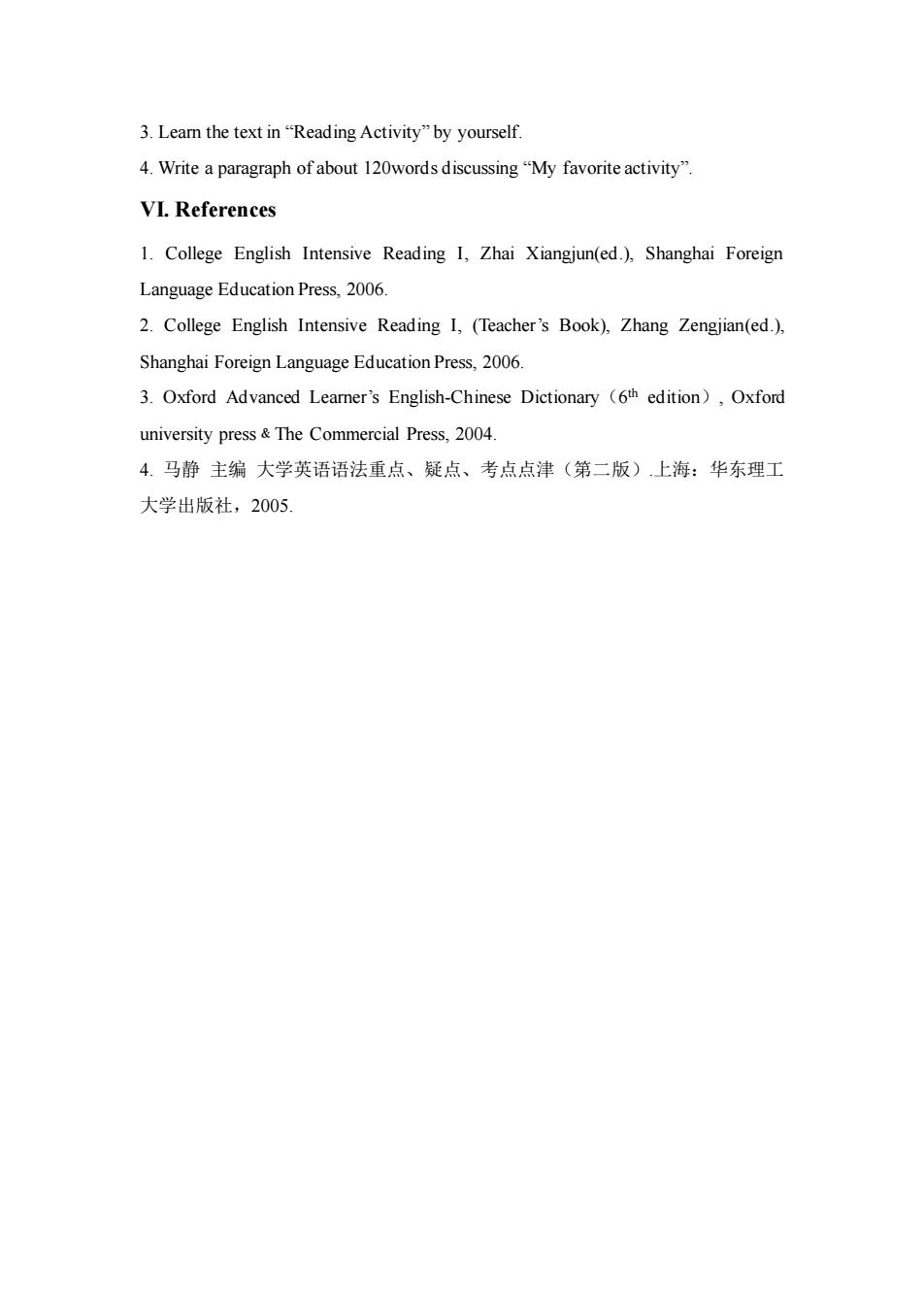
3.Leam the text in"Reading Activity"by yourself. 4.Write a paragraph ofabout 120words discussing"My favorite activity". VI.References 1.College English Intensive Reading I,Zhai Xiangjun(ed.),Shanghai Foreign Language Education Press,2006. 2.College English Intensive Reading I.(Teacher's Book),Zhang Zengjian(ed.). Shanghai Foreign Language Education Press,2006 3.Oxford Advanced Learner's English-Chinese Dictionary (6th edition),Oxford university press &The Commercial Press,2004. 4.马静主编大学英语语法重点、疑点、考点点津(第二版)上海:华东理工 大学出版社,2005
3. Learn the text in “Reading Activity” by yourself. 4. Write a paragraph of about 120words discussing “My favorite activity”. VI. References 1. College English Intensive Reading I, Zhai Xiangjun(ed.), Shanghai Foreign Language Education Press, 2006. 2. College English Intensive Reading I, (Teacher’s Book), Zhang Zengjian(ed.), Shanghai Foreign Language Education Press, 2006. 3. Oxford Advanced Learner’s English-Chinese Dictionary(6 th edition), Oxford university press﹠The Commercial Press, 2004. 4. 马静 主编 大学英语语法重点、疑点、考点点津(第二版).上海:华东理工 大学出版社,2005